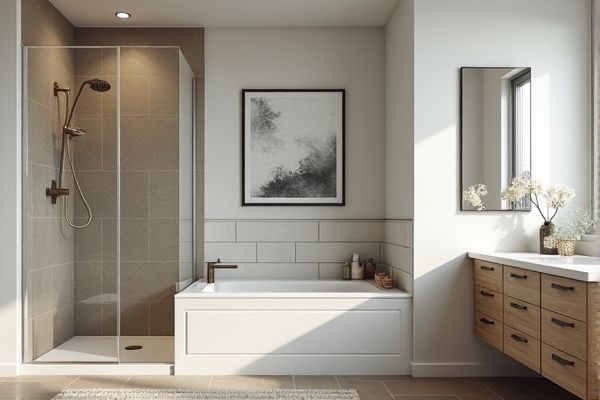
Corner showers maximize bathroom space by fitting snugly into corners, ideal for smaller rooms, while alcove showers are designed to be installed between three walls, providing a more enclosed and traditional bathing experience. Discover which option best suits your bathroom layout and personal preferences by reading the rest of the article.
Table of Comparison
| Feature | Corner Shower | Alcove Shower |
|---|---|---|
| Installation Location | Fits in bathroom corners | Installed in a recessed alcove with three walls |
| Space Efficiency | Maximizes corner space, ideal for small bathrooms | Requires one full wall space but saves floor space |
| Shape | Often quadrant-shaped or neo-angle | Rectangular or square |
| Accessibility | Limited entry space, usually sliding or pivot door | More entry space with hinged or sliding doors |
| Installation Complexity | Moderate, requires precise corner fitting | Simpler, uses existing alcove walls |
| Water Containment | Good, with proper door sealing | Excellent, three-wall design minimizes splashing |
| Design Flexibility | Limited by corner dimensions | More options for tile and shower fixtures |
| Cost | Typically higher due to custom shapes | Generally lower and easier to install |
Overview: Corner Showers vs Alcove Showers
Corner showers maximize bathroom space by fitting into unused corners, ideal for smaller or irregularly shaped rooms, while alcove showers are installed within three enclosing walls, offering a more traditional and spacious bathing area. Corner showers often feature triangular or neo-angle designs that enhance room flow, whereas alcove showers provide more wall space for fixtures and storage options like built-in shelves. Your choice between corner and alcove showers depends on bathroom layout, space availability, and aesthetic preferences to optimize both functionality and style.
Design and Layout Differences
Corner showers maximize bathroom space by fitting into a 90-degree angle, making them ideal for small or irregularly shaped rooms, while alcove showers are installed between three walls, offering a more enclosed and traditional layout. Corner showers often feature a curved or angled door, enhancing accessibility and modern aesthetics, whereas alcove showers typically have a straight, sliding, or hinged door that complements linear bathroom designs. The choice between corner and alcove showers significantly impacts overall bathroom flow, with corner units optimizing compact spaces and alcove showers providing a classic, built-in appearance.
Space Efficiency Comparison
Corner showers maximize bathroom space by fitting neatly into a corner, ideal for small or irregularly shaped rooms, while alcove showers require three surrounding walls, occupying more linear wall space. The triangular footprint of corner showers frees up floor area, making them more efficient in compact layouts. Alcove showers offer a traditional installation but may limit space flexibility due to their rectangular design.
Installation Process and Requirements
Corner showers require precise measurements to fit snugly into a 90-degree corner, often necessitating custom glass panels and specialized waterproofing to prevent leaks. Alcove showers are installed within three walls, demanding standard plumbing adjustments and installation of a shower surround or tiled enclosure, which simplifies waterproofing compared to corner units. Both types require proper floor drainage and waterproof barriers, but alcove showers typically involve fewer custom fabrication steps, making them easier and faster to install in standard bathroom layouts.
Accessibility and User Convenience
Corner showers maximize bathroom space with easy access from multiple angles, making them ideal for compact areas and enhancing user convenience. Alcove showers, enclosed on three sides, provide a more defined showering area but may restrict movement and accessibility, especially for individuals with mobility challenges. Choosing between the two depends on your bathroom layout and the level of accessibility you prioritize.
Style and Customization Options
Corner showers offer sleek, space-saving designs ideal for modern bathrooms, featuring curved or neo-angle glass panels that maximize room flow. Alcove showers present versatile customization options, allowing installation between three walls with choices in tile patterns, built-in niches, and sliding or hinged doors to enhance functionality and style. Both types accommodate various fixtures and finishes, but corner showers excel in creating contemporary, minimalist aesthetics, while alcove showers provide traditional or elaborate design flexibility.
Cost Comparison: Corner vs Alcove Showers
Corner showers generally cost less due to their smaller size and simpler installation requirements, with prices averaging between $800 and $2,500. Alcove showers typically range from $1,200 to $4,000, reflecting the need for three finished walls and more materials. Labor costs for alcove showers tend to be higher because of increased plumbing and tiling complexity compared to corner shower setups.
Maintenance and Cleaning Considerations
Corner showers typically have fewer edges and seams than alcove showers, making them easier to clean and less prone to mold and mildew buildup. Alcove showers, enclosed by three walls, often require more frequent maintenance to address grout lines and caulking that can trap dirt and moisture. Choosing a corner shower can simplify your cleaning routine while reducing the risk of persistent grime in hard-to-reach areas.
Pros and Cons of Corner Showers
Corner showers maximize bathroom space by fitting neatly into room angles, offering compact designs ideal for small areas. They typically provide easier access and can include curved doors that save floor space, but their smaller size may limit movement and storage options compared to other shower types. Installation complexity and fewer style choices are common drawbacks, making them less versatile than alcove showers that fit standard three-wall recesses.
Pros and Cons of Alcove Showers
Alcove showers offer space efficiency by fitting into three-walled enclosures, making them ideal for smaller bathrooms and easier to install with existing plumbing. They provide a clean, streamlined look and often include built-in shelves or niches for storage, but their confined space can limit movement and comfort compared to open designs. Maintenance is straightforward due to fewer exposed surfaces, though water splashing outside the enclosure can be a potential issue if not properly sealed.
 homyna.com
homyna.com